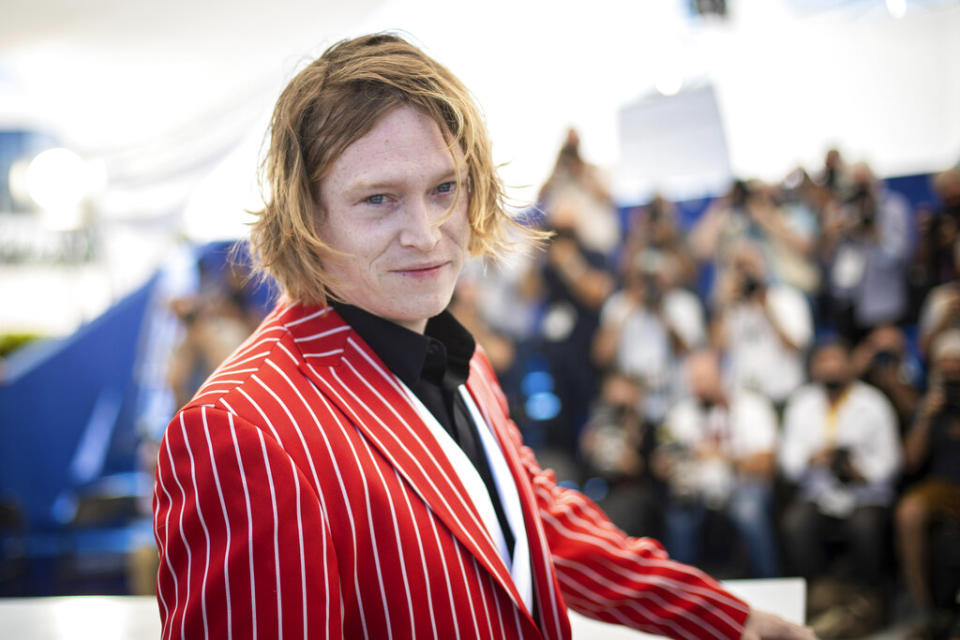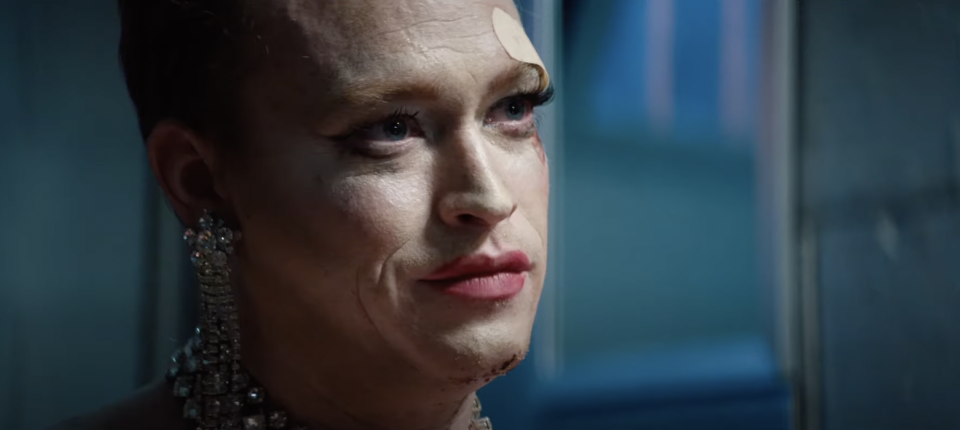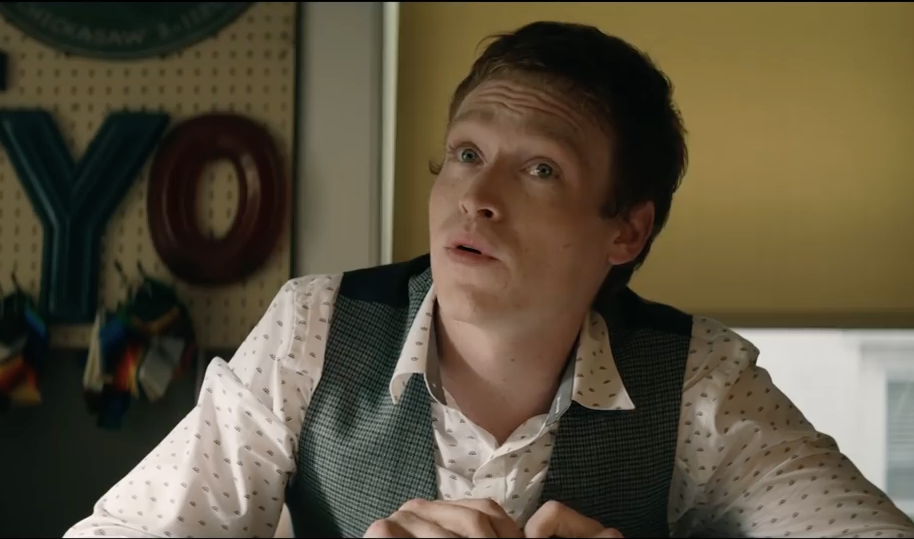Caleb Landry Jones Donned Drag and Bonded with 35 Dogs to Go Dark for Luc Besson’s ‘DogMan’

Redhead Caleb Landry Jones got lucky on his first audition, at age 17. His father took a day off from work and drove him from Garland, Texas, to Dallas for a try-out, then to Austin for a callback with the Coen brothers, for a role as “the boy on the bike” in eventual Best Picture Oscar-winner “No Country for Old Men” (2007). Little did Jones know, as he launched his acting career, that he would join the ensemble on “X-Men: First Class” (2011) or win Best Actor at Cannes for playing a mass murderer in “Nitram” (2021), or that one critic would dub him “a menacing oddball character actor.”
When I read that quote to Jones over Zoom, he paused for a moment and said, “That sounds OK to me. I heard ‘actor,’ so that sounded good.”
More from IndieWire
The Coens did Jones a huge favor, he said. “Javier Bardem. Not a bad person to see on set for the first time. I just remember going, ‘Man, this is the place for me. These guys are having fun, but they’re all [whispers] really serious about it. They’re all really trying to do something. And I have no idea what it is.’ It was a big difference from high school’s black box theater, where everyone’s giggling and sounds like helium Beatles. You go on set and meet some nice folks that are dedicated to props, to costume, to set design, to sound. These specialists had all these stories, and had been a part of things I’d never heard of, but wanted to know about.”
After that debut, Jones took his job seriously, too. To tackle his latest lead role in “DogMan” (Briarcliff Entertainment, March 29), playing Douglas, an abused man whose father not only threw him in a cage to live with dogs but shot him in the back and paralyzed him, putting him in a wheelchair, the actor took almost a year to prepare a psychologically coherent and sympathetic character. Here, he collaborates with writer-director Luc Besson.

“The time beforehand was filled with a bunch of conversations,” said Jones, “pasta [chuckles], talking about the character and going through the script and hearing about his ideas and any thoughts I had and getting used to one another.”
Jones took ballet and singing lessons, met with a trainer’s wolves, walked with a circus elephant, and heard from a doctor about “the difference between a bullet here and there,” he said. “Usually, you’re left to your own devices. So you’re very lucky when that stuff is there for you.”
Douglas winds up living with a large number of dogs that he trains to conduct jewelry heists. Jones had to both bond with and stay out of the way of 35 dogs in many scenes — more than 100 in one brutal action sequence — and their wranglers’ barking commands.
“The sound department had a rough, rough time,” he said, laughing. “It’s my job to give the trainers space and come see the dogs in the morning and maybe at lunch, maybe over some cigarettes. Once we’re trying to get in position and someone’s coming through a trap door and someone else was going to fall through here, you just stay out of the way.”

And Douglas also dons drag to perform in a cabaret, his joyful escape. Until he discovers the love of performing, he is trapped: “Not understanding why things have happened to you, feeling as if nothing can get any worse, not being able to see yourself in any other position than the one you’re in, and feeling no way out,” said Jones. “And then suddenly a beautiful woman [Salma, played by Grace Palma] comes and shares with you this idea of being anything you want to be, and in the space and time being able to forget all of that. For Douglas, and I think for a lot of actors, there is something that is beneficial to the human for embarking on it. And you get lucky if you can get paid to do it. In this movie, same stuff: Through acting, he’s able to find another reality, a love, he’s able to be anything he wants to be.”
Jones, who is a professional musician, does a damned good Edith Piaf. “Thankfully, I didn’t have to actually sing it,” he said, “because if we did it, we wouldn’t be sitting here.”
Why does Douglas embrace drag? “It’s what happens when he thinks the doors shut on him forever,” he said. “Because he loses Salma, the only part of them that got to be free, is gone. And he’s given up on it. And he thinks, ‘That’ll never happen again.’ And to not even try for it once he is rejected. But he meets a gaggle of folks who let him in and give him the opportunity again. For once a week, he gets to live and gets to forget.”

Despite the mixed reviews for “DogMan,” not of Jones’ performance but the violent excesses of the genre film around him, the actor is eager to work with Besson again, returning to Paris to play a vampire in Besson’s “Dracula: A Love Tale.” He’s playing a 15th-century prince who renounces God after his wife dies and becomes a vampire. The movie starts filming in a month in France, just as Robert Eggers’ “Nosferatu,” starring Bill Skarsgård, soon opens in December from Focus.
“I’m excited to see the other one that’ll be coming out,” Jones said. “They’ll be very different from one another. One will be classical and one will be Luc Besson. Why not?”
Despite the controversies around him, Besson “is all right,” Jones said. “He’s a distinct voice. I like artists like that, folks that feel like they stay true to themselves, regardless of the shift of society, or whatever’s popular at the moment, or what other people think is going to be successful. I love that he sticks to doing what he wants to do, regardless of what the folks say is going to work or not work. But he also has a work ethic that is rare. It’s hard to make a movie, but because he writes and directs it, and he shot this film. The camera was on his shoulders all the time. And he was constantly lighting and running between every department and getting everything to where it needed to be. He had his finger on everything, from the top of the day to the end of the day, every day. Nothing was on his mind other than the film.”
And Jones sees things the same way. “It takes a lot to make something,” he said. “If I’m not about to get kicked out of the house because of rent, then I try my best to hold off and do something that scares the shit out of you and is exciting and you think you can’t do and something that pulls at you. But I’ve been fortunate to be getting to do that — or look like I’m getting to do it.”
Next up: He stars in Athina Rachel Tsangari’s adaptation of Jim Crace’s novel “Harvest.” It’s the film Jones was in the middle of shooting while at the press conference for “DogMan” at Venice, when he didn’t let go of his Scottish accent because he was afraid he would lose it. He had a lengthy dialogue scene the next day.
“I felt when reading it, ‘Holy shit! OK! I haven’t seen that,'” he said. “I don’t know what to call it. A Scottish Western with these elements of Samurai and something else. It’s a movie about capitalism. I’m nervous and excited.”
Best of IndieWire
Sign up for Indiewire's Newsletter. For the latest news, follow us on Facebook, Twitter, and Instagram.


